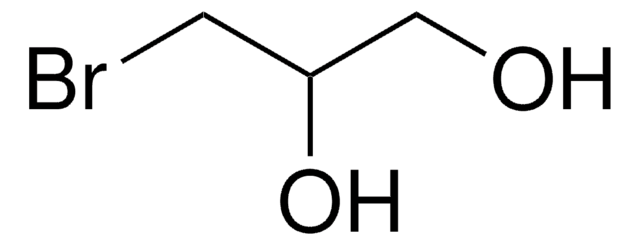Wichtige Dokumente
540056
(R)-(−)-3-Chlor-1,2-propandiol
97%, optical purity ee: 98% (GLC)
Synonym(e):
(R)-α-Glycerinchlorhydrin
About This Item
Empfohlene Produkte
Dampfdruck
0.04 mmHg ( 25 °C)
Qualitätsniveau
Assay
97%
Optische Aktivität
[α]20/D −1°, neat
Optische Reinheit
ee: 98% (GLC)
Brechungsindex
n20/D 1.48 (lit.)
bp
213 °C (lit.)
Dichte
1.321 g/mL at 20 °C (lit.)
Funktionelle Gruppe
chloro
hydroxyl
SMILES String
OC[C@@H](O)CCl
InChI
1S/C3H7ClO2/c4-1-3(6)2-5/h3,5-6H,1-2H2/t3-/m0/s1
InChIKey
SSZWWUDQMAHNAQ-VKHMYHEASA-N
Suchen Sie nach ähnlichen Produkten? Aufrufen Leitfaden zum Produktvergleich
Verwandte Kategorien
Rechtliche Hinweise
Signalwort
Danger
Gefahreneinstufungen
Acute Tox. 2 Inhalation - Acute Tox. 3 Oral - Carc. 2 - Eye Dam. 1 - Met. Corr. 1 - Repr. 1B - Skin Irrit. 2 - STOT RE 1 Oral - STOT SE 1 Oral
Zielorgane
Kidney
Lagerklassenschlüssel
6.1A - Combustible acute toxic Cat. 1 and 2 / very toxic hazardous materials
WGK
WGK 3
Flammpunkt (°F)
275.0 °F - closed cup
Flammpunkt (°C)
135 °C - closed cup
Persönliche Schutzausrüstung
Eyeshields, Faceshields, Gloves, type ABEK (EN14387) respirator filter
Hier finden Sie alle aktuellen Versionen:
Besitzen Sie dieses Produkt bereits?
In der Dokumentenbibliothek finden Sie die Dokumentation zu den Produkten, die Sie kürzlich erworben haben.
Kunden haben sich ebenfalls angesehen
Unser Team von Wissenschaftlern verfügt über Erfahrung in allen Forschungsbereichen einschließlich Life Science, Materialwissenschaften, chemischer Synthese, Chromatographie, Analytik und vielen mehr..
Setzen Sie sich mit dem technischen Dienst in Verbindung.












